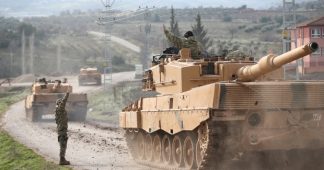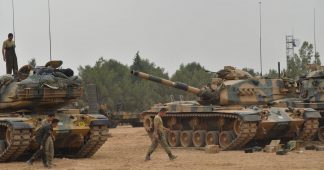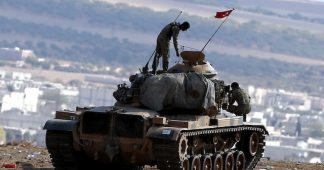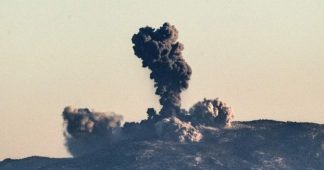By Bill Van Auken
25 January 2018
In its first National Defense Strategy document issued in over a decade, the Pentagon this month bluntly declared that its nearly two-decade focus on the so-called global war on terror was over, and that it has adopted a new strategic orientation toward preparing for “great power” confrontation, i.e., war with nuclear-armed Russia and China.
In Syria, the Pentagon’s declared strategic shift has already been realized in bloody facts on the ground. The US plans to permanently occupy parts of Syria, impose a client regime of its own choosing, and destroy the influence of its rivals. These moves have sparked the ongoing Turkish invasion in the northwestern Syrian Kurdish enclave of Afrin, which threatens to spark a much broader and bloodier conflict.
US Secretary of State Rex Tillerson made public the new war of Syrian annexation on January 18 before an audience at Stanford University’s Hoover Institution. He stated that US forces—at least 2,000 troops—will remain in Syria indefinitely. He also dispensed with the phony pretext that Washington invaded Syria to wage the war on terror, in this case in the form of the Islamic State of Iraq and Syria (ISIS).
Tillerson made it clear that the aim of US imperialism is to pursue its own geo-strategic interests against those of its principal rivals in the region. The US is, above all, determined to prevent any Russian, Iranian and Turkish brokered settlement of the war that does not achieve the original aim of regime change initiated by the US.
This policy is in line with the demands of the Democratic Party and those sections of the ruling class that have criticized the Trump administration for not adopting an aggressive enough policy in Syria and against Russia. The Washington Post, aligned with the Democrats and owned by Amazon’s Jeff Bezos, hailed the move in an editorial Monday, “Tillerson tells the truth about Syria.”
The Post praised Tillerson for making “an implicit break with US policy of the past several years, which was to seek Syria’s pacification primarily through diplomatic deals with Russia.” Rather than negotiations with Russia, the US must maintain a “serious and sustainable” commitment of military forces in Syria, which will inevitably be directed not just against Assad, but against Moscow and Tehran as well.
Tillerson’s statement came less than a week after the US command in Iraq and Syria announced that it was organizing a 30,000-strong border security force, consisting primarily of the Syrian Kurdish YPG militia, which has served as the main American proxy ground force in Washington’s three-and-a-half-year-old Syria intervention.
It was this provocative policy unveiled by Tillerson and the Pentagon that provoked Turkey, which refuses to accept the deployment of Kurdish militia on its border or any move to set up a Kurdish autonomous region in Syria. Turkey fears that such moves would only revive the struggle of oppressed Kurds against the autocratic regime in Ankara.
Turkey launched its invasion of Afrin after unconvincing attempts by US officials to walk back the announcement of the planned border force. On Wednesday, Turkish President Recep Tayyip Erdogan threatened that the Turkish army will move from Afrin into Manjib, just east of the Euphrates River, which was conquered by YPG militia forces backed by US troops in August of 2016. American special forces remain deployed in the city, using it as a hub for their operations and a training site for their Syrian proxies.
Such an advance would set the stage for an armed clash between the US and its ostensible NATO ally, Turkey, further destabilizing the region and creating a flashpoint for a third world war.
US President Donald Trump held a phone call with Erdogan on Wednesday in which Trump warned “against the growing risk of conflict between the two nations,” according to the New York Times. The Times added that the call “marked an abrupt reversal from a White House briefing just a day earlier, where senior administration officials suggested that the United States would side with Turkey, a NATO ally, in disputes with Kurdish forces.”
Pentagon officials had in recent days indicated that, if necessary, the US military is prepared to dispense with the services of the Kurdish YPG militia, which has provided the cannon fodder for American operations in Syria under the mantle of the “Syrian Democratic Forces” (SDF).
“We don’t see the YPG as currently the majority element (of the SDF),” one Pentagon official told the Voice of America, Washington’s officials propaganda outlet. “We have a much more populous and much more capable Arab force that we can use.”
This “more populous and … more capable” force will undoubtedly be drawn from the very same “terrorists” that the US used as the pretext to invade Syria in the first place. In the waning days of the murderous US-YPG siege of Raqqa, the US military oversaw the evacuation of some 4,000 ISIS fighters from the city so that they could be deployed against Syrian government troops advancing on the country’s main oil fields. These same ISIS fighters are now to be rebranded as Syrian Democratic Forces to fight the Assad government and both Iranian and Russian forces within the country.
Thus, the shift from the “war on terror” to “great power” conflict assumes a particularly crude and criminal form.
As for the Syrian Kurds, they are to be subjected to an entirely predictable betrayal, one in a long historical series of such tragedies engendered by naked imperialist carve-ups in the Middle East and the bankrupt attempts of the Kurdish bourgeois nationalist leaderships to hitch their wagons to one or another imperialist power.
However the current tensions between Turkey and the US are resolved, either through another tragedy for the Kurds and the Syrian population as a whole, or a head-on military clash between the two NATO allies, the present crisis has laid bare the immense dangers confronting the international working class.
Excerpt from an article published in WSWS











